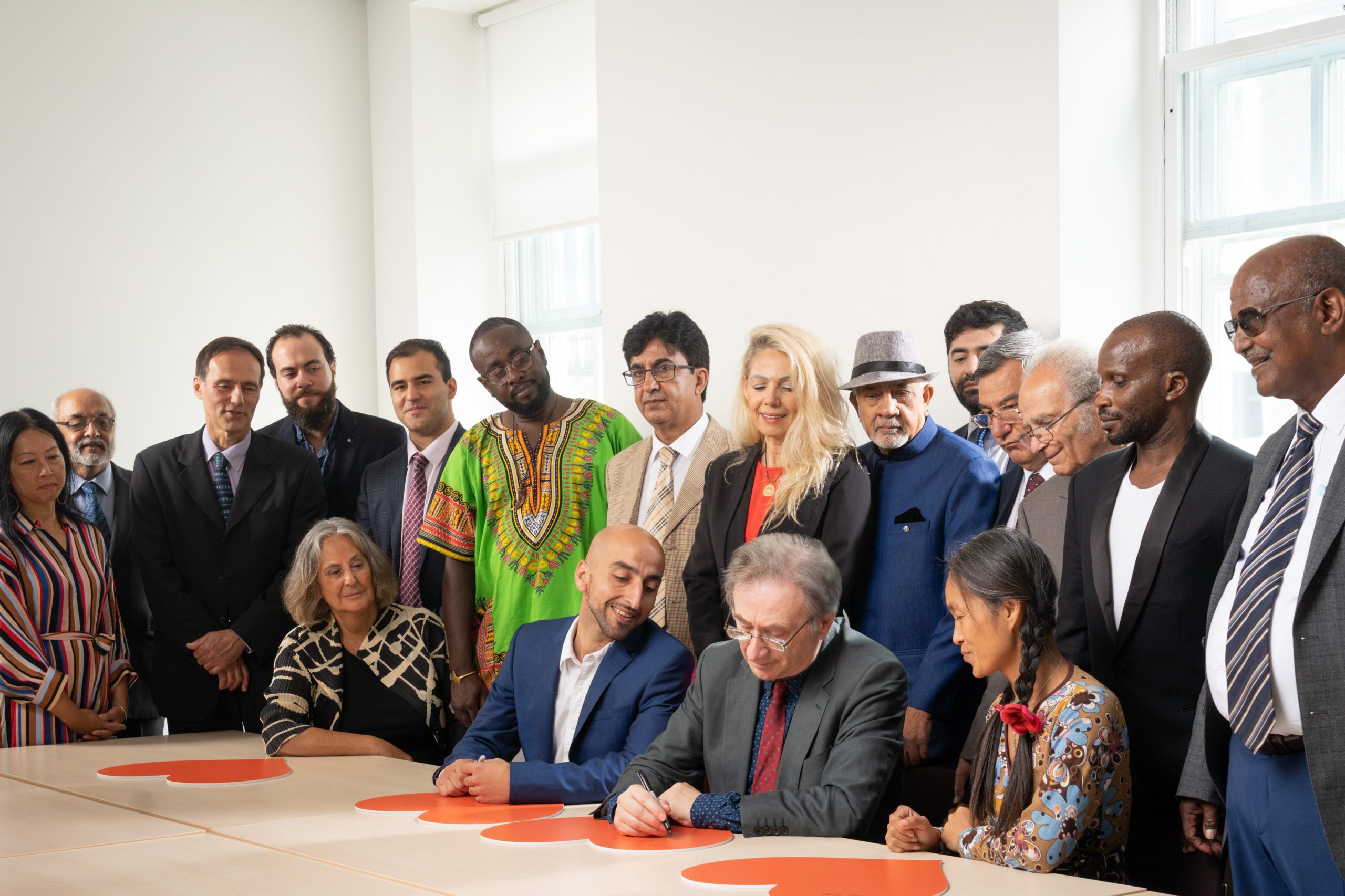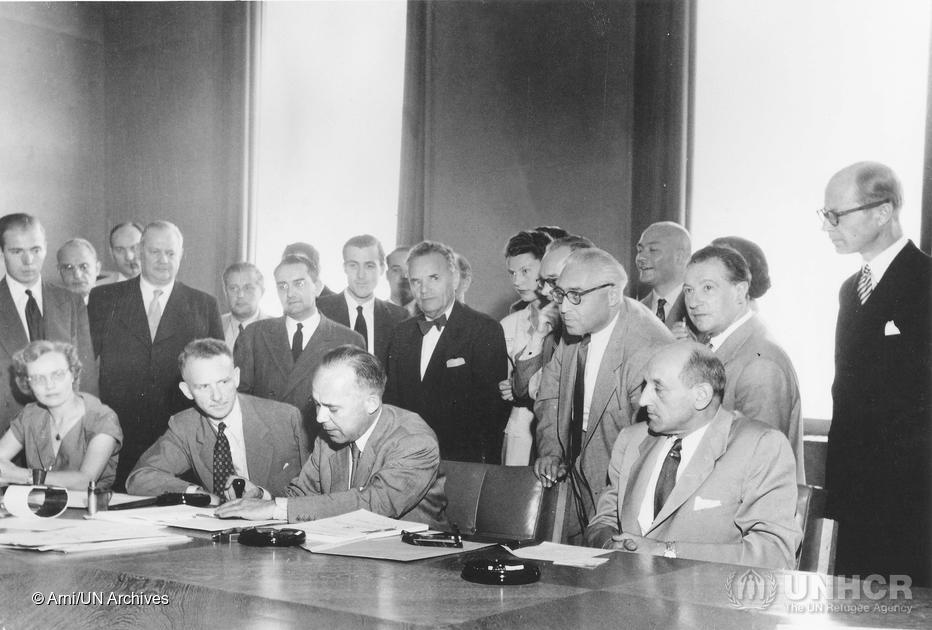Refugees re-create iconic image of the signing of the UN Refugee Convention on its 70th anniversary
Seventy years today since the UK signed the UN Refugee Convention (28 July), refugees from each of those seven decades have come together to re-create the iconic photograph of the original signing of the Convention – but with refugees taking the place of the 1951 diplomats. It aims to celebrate Britain’s history of protecting refugees and to urge that it is upheld for the future.
The photograph, created by coalition campaign Together With Refugees, brings together refugees spanning recent history: from dissident writers escaping communism in the 1950s to Syrian families fleeing war today, alongside Ugandan Asians who fled the tyranny of Idi Amin and people who escaped ethnic cleansing in the Balkans. In the place of the UN document, they signed an orange heart, a symbol of support for refugees.
Findings from an ICM poll revealed today that three in five people (59%) are proud that Britain has protected refugees since it signed the Convention in 1951.
George Szirtes (72), who took part in the re-creation photograph, is a successful writer who lives in Norwich. He arrived in the UK as a refugee in 1956 at eight years old, having fled Hungary following the Soviet response to the Hungarian Uprising.
He said: “Giving safety to people fleeing war and persecution was necessary 70 years ago and I suspect it is more necessary now than ever before.”
Dr Saad Maida (37), who also took part in the photograph, is a doctor working in the NHS and lives in Leamington Spa. He arrived in the UK in 2010 to study and was given refugee status in 2014 because he needed protection from the war and violence in Syria. He said:
“The UN Convention has had a huge impact on me. I always carry my official documentation, which has ‘28 July 1951’ printed on it – a date I will never forget. It has given refugees freedom and acknowledges that we have rights: that we need more than safety and shelter and food. I feel immense gratitude and hope somehow to pay that back.
“It’s a great milestone, to be able to celebrate it and to pause and reflect on what that has meant for hundreds of thousands of refugees from then until now. “
Enver Solomon, a spokesperson for Together With Refugees and CEO of the Refugee Council, said: “Seventy years ago, after the horrors of World War Two, the UK signed the Refugee Convention. We gave our commitment to protect people fleeing war and persecution. Since then, it has saved hundreds of thousands of lives – from those fleeing ethnic cleansing in the Balkans, torture in Zimbabwe or war in Syria. These are people who have gone on to make huge contributions to our communities as proud Britons. And we must continue to safeguard this promise of safety.”
Among the many other refugees from across the last 70 years taking part in the photograph were:
Gillian Slovo (69), a well-known author and playwright who arrived in the UK from South Africa in 1964 with her mother and two sisters. Her parents were both active in the opposition to the apartheid regime: her father, Joe Slovo had left South Africa to seek international support for armed resistance to apartheid but when the leaders of the ANC were caught inside the country he could not return and got temporary permission to stay in the UK. Gillian’s mother, Ruth First, had just served 117 days in solitary detention in jail when they left the country.
Gillian said: “The best thing about starting a new life in Britain was that I wasn’t in South Africa – that I didn’t have to be worried when there was a knock at the door. In South Africa the police were constant visitors and there was a constant fear that my parents could disappear at any time. It didn’t feel like that in England.
“I think it’s really important that Britain continues to protect refugees. It’s what makes us human – the fact that we recognise suffering in other human beings and we do what we can to alleviate it.”
Mukund Nathwani (72) came to England in 1972 from Uganda, aged 23. He had been a teacher in the city of Mbale but fled, with many others, when Ugandan dictator Idi Amin announced the expulsion of the country’s Asian population.
He said: “I had to leave Uganda because I had no choice. If I’d stayed there any longer I wouldn’t be alive today.
“The best thing about getting to the UK was that at least we arrived in this country alive. We thought ‘we’ve got a new life’ – people were welcoming and we thought ‘well, we’ve come to the right place’. We had to forget Uganda. My mind became restful after coming to this country. We were happy that we were in this country.
“It’s important for Britain to continue protecting refugees because it saved my life and they’ll be saving the lives of others across the world.”
Hong Dam, is a digital artist and writer based in Brighton. Born to a Chinese father and Vietnamese mother, she fled with her family when war broke out between Vietnam and China when she was eight years old. Hong boarded an overcrowded fishing boat and travelled with hundreds of others to the relative safety of Hong Kong. From there her family were resettled in the UK in 1980.
She said: “When I got to the UK, my teachers really shaped me into who I am today. I came to England knowing no more than a few words in English, just ‘apple’, ‘pear’, ‘please’ and ‘thank you’. They were very patient and there was no judgement from them.
“What I do feel the Refugee Convention has given me is hope – an opportunity to be human, to be safe and to be with my family.”
Remzije Duli, 51, came to UK from Kosovo in 1991 when she was 23. She was in the third year of her medical degree, but when sitting one of her exams the Special Forces entered the university and arrested her teachers and professors. She could no longer study and decided to come to the UK as an au pair to learn English. During that time the situation in Kosovo got much worse and she applied for refugee status, which took five years. During this time she continued to study pharmaceutical chemistry at Queen Mary’s University, London, graduating in 1999.
She said: “Being able to make people feel safe is one of the greatest achievements that any country can do.”
“Britain helped me with everything that I am today: all the achievements, both as a parent and professionally. As a result I’m able to give back and help others in need.
Aloysius Ssali came to the UK in 2003 to study but when he returned to Uganda in 2005 he was captured and tortured because of his sexuality. He still had six months left on his student visa, so he fled to the UK. The UK didn’t formally recognise sexuality as a reason for claiming refugee status until 2010, but in 2010 he became one of the very first people to be recognised with refugee protection in the UK on the grounds of sexual orientation or gender identity.
He said: “I started linking up with some other LGBT people and they said ‘You can stay here. It is safe. Nobody can scare you any more.’ That was very important.
“Celebrating 70 years of the Refugee Convention, especially for someone like me, a refugee in this wonderful country, I don’t take that for granted. I am who I am now because of the British people, they granted me refugee status and gave me another chance to live.
“To me personally, refugee protection means freedom, another life. That is important. If it wasn’t for refugee protection from the British people I wouldn’t be here.”


The backgrounds of those taking part in the event tells a story of 70 years of the UK offering safety to people fleeing war and tyranny:
- 1950s: Hungarians fleeing repression following the 1956 uprising against communism.
- 1960s: Czech dissidents fleeing after the 1968 Soviet-backed invasion.
- 1970s: Ugandan Asians expelled by dictator Idi Amin; Vietnamese people fleeing war; Chileans escaping from persecution under General Pinochet’s dictatorship.
- 1980s: Iranians fleeing revolution, persecution and war; Iraqi Kurds escaping persecution from Saddam Hussein; Sri Lankan Tamils fleeing war and persecution.
- 1990s: People from Kosovo, Bosnia and across the Balkans fleeing conflict and ethnic cleansing after the disintegration of Yugoslavia; Zimbabwean opposition supporters escaping from Mugabe.
- 2000s: People from Iraq and Afghanistan finding safety from the Taliban and other armed groups in the aftermath of wars in Iraq and Afghanistan.
- 2010s: Refugees from war in Syria, South Sudan; Eritreans fleeing human rights abuses.
The UN Refugee Convention 1951 formalised the rights of refugees under international law. It means that countries signed up to it have a legal duty to protect those fleeing persecution and serious harm in other countries. Some 149 countries have signed up to this law, including the UK.
The Nationality and Borders Bill, which is currently going through Parliament and was debated for the first time last week, threatens to undermine the fundamental principles of the Convention. It would mean that thousands of vulnerable people who would currently be accepted as refugees will no longer be given safety in the UK due to the method of their arrival. Some could be criminalised and put in prison for up to four years.
The campaign coalition, Together With Refugees, is calling for a more effective, fair and humane approach to the UK’s refugee system that: allows people to have a fair and efficient hearing for their claim for protection, including those who endured traumas and struggle to get here; ensures people can live in dignity in communities while they wait to find out if they will be granted protection; enables refugees to rebuild their lives and make valuable contributions to their communities; and where the UK works with other countries to do its part to help people forced to flee their homes.

